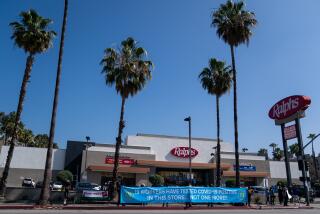Judge says Abercrombie wrongly fired Muslim for wearing head scarf
A federal judge in San Francisco has ruled that trendy clothing retailer Abercrombie & Fitch wrongly fired a Muslim worker who insisted on wearing a head scarf.
The company violated anti-discrimination laws when it fired Hani Khan from its Hollister store in San Mateo, Calif., in 2010, U.S. District Judge Yvonne Gonzalez Rogers ruled last week.
The company claimed that the head scarf violated its policy governing the look of its employees, which it said was part of its marketing strategy. The store argued that deviating from its policy would affect sales.
But the judge said Abercrombie & Fitch offered no “credible evidence” that Khan’s head scarf cost the company any sales.
“Abercrombie only offers unsubstantiated opinion testimony of its own employees to support its claim of undue hardship,” Rogers said.
The U.S. Equal Employment Opportunity Commission filed a lawsuit on Khan’s behalf in 2011.
“Abercrombie & Fitch does not discriminate based on religion and we grant religious accommodations when reasonable,” spokesman Bruce MacKenzie said. “It is our policy not to comment on pending litigation.”
A trial on the company’s liability is scheduled for this month. The judge said the jury is free to award punitive damages if it chooses.
It’s the latest employment discrimination charge against the company’s so-called look policy, which critics say means images of mostly white, young, athletic-looking people. The New Albany, Ohio, company has said it does not tolerate discrimination.
Abercrombie has been the target of numerous discrimination lawsuits, including a federal class action brought by black, Latino and Asian employees and job applicants that was settled for $40 million in 2004. The company admitted no wrongdoing, though it was forced to implement new programs and policies to increase diversity.
More to Read
Inside the business of entertainment
The Wide Shot brings you news, analysis and insights on everything from streaming wars to production — and what it all means for the future.
You may occasionally receive promotional content from the Los Angeles Times.










